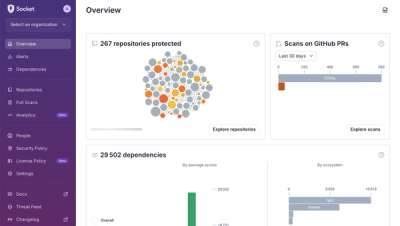
Research
Using Trusted Protocols Against You: Gmail as a C2 Mechanism
Socket uncovers malicious packages on PyPI using Gmail's SMTP protocol for command and control (C2) to exfiltrate data and execute commands.
StorylineMapper is a Python tool for performing community detection on narrative texts. It uses advanced network analysis techniques to identify and visualize relationships and communities within the text, helping to uncover hidden connections and structures.
https://pypi.org/project/storylinemapper/0.3.1/

Before you start, ensure you have the following prerequisites installed on your machine:
git clone https://github.com/kenjinezumi/storylinemapper.git
cd storylinemapper
pip install -r requirements.txt
pip install -e .
python -m spacy download en_core_web_sm
To run StorylineMapper, use the following command in your terminal:
storylinemapper community-detection "YOUR_TEXT_HERE" --method louvain --output OUTPUT_FILENAME --design-options
Example
Here is an example command to run community detection using the Louvain method and output the results to community_network.html
```bash
storylinemapper community-detection "Dr. Emily Watson, a leading scientist from the Global Institute of Advanced Technologies (GIAT), collaborated with Dr. James Carter from the National Research Institute (NRI) on a groundbreaking quantum computing project..." --method louvain --output community_network.html --design-options
--method: Specifies the community detection method to use (e.g., louvain, infomap, etc.). Default is louvain.--output: Specifies the output file name (e.g., community_network.html).--design-options: Adds additional design options to the visualization, such as node shapes, colors, and layouts.The output file will be an HTML file (community_network.html in the example) containing a visual representation of the detected communities and relationships between entities in the text.
FAQs
A library to generate networks of characters and timelines based on text
We found that storylinemapper demonstrated a healthy version release cadence and project activity because the last version was released less than a year ago. It has 1 open source maintainer collaborating on the project.
Did you know?

Socket for GitHub automatically highlights issues in each pull request and monitors the health of all your open source dependencies. Discover the contents of your packages and block harmful activity before you install or update your dependencies.

Research
Socket uncovers malicious packages on PyPI using Gmail's SMTP protocol for command and control (C2) to exfiltrate data and execute commands.

Product
We redesigned Socket's first logged-in page to display rich and insightful visualizations about your repositories protected against supply chain threats.

Product
Automatically fix and test dependency updates with socket fix—a new CLI tool that turns CVE alerts into safe, automated upgrades.